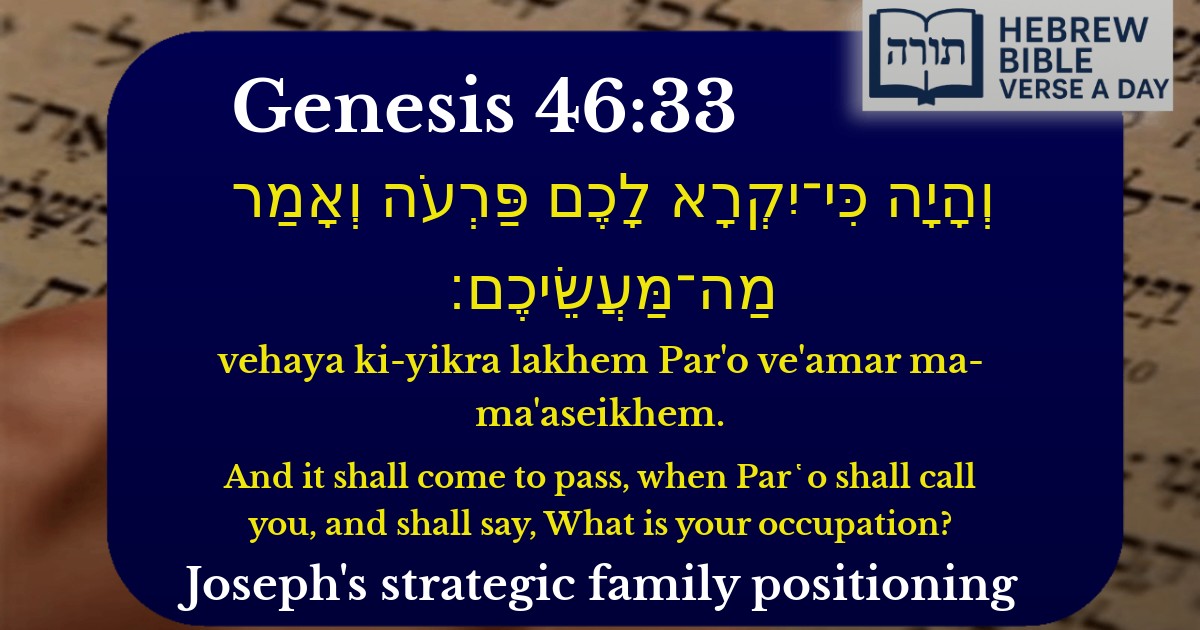Join Our Newsletter To Be Informed When New Videos Are Posted
Join the thousands of fellow Studends who rely on our videos to learn how to read the bible in Hebrew for free!
Hebrew Text
וְהָיָה כִּי־יִקְרָא לָכֶם פַּרְעֹה וְאָמַר מַה־מַּעֲשֵׂיכֶם׃
English Translation
And it shall come to pass, when Par῾o shall call you, and shall say, What is your occupation?
Transliteration
Vehaya ki-yikra lakhem Par'o ve'amar ma-ma'aseikhem.
Hebrew Leining Text
וְהָיָ֕ה כִּֽי־יִקְרָ֥א לָכֶ֖ם פַּרְעֹ֑ה וְאָמַ֖ר מַה־מַּעֲשֵׂיכֶֽם׃
וְהָיָ֕ה כִּֽי־יִקְרָ֥א לָכֶ֖ם פַּרְעֹ֑ה וְאָמַ֖ר מַה־מַּעֲשֵׂיכֶֽם׃
🎵 Listen to leining
Parasha Commentary
📚 Talmud Citations
This verse is not quoted in the Talmud.


Context of the Verse
The verse (Shemot 1:18) appears in the narrative where Pharaoh, concerned about the growing Israelite population in Egypt, seeks to oppress them. He calls upon the Hebrew midwives, Shifra and Puah, and questions them about their actions regarding the Israelite births.
Rashi's Commentary
Rashi explains that Pharaoh's question, "What is your occupation?", was a test to see if the midwives would admit to assisting Hebrew women in childbirth. He notes that Pharaoh suspected they were helping the Israelite women survive despite his decree to kill male infants. Rashi emphasizes that the midwives' refusal to comply with Pharaoh's evil decree demonstrated their righteousness and fear of G-d (Rashi on Shemot 1:18).
Ibn Ezra's Insight
Ibn Ezra suggests that Pharaoh's inquiry was not merely about their profession but was a veiled accusation. He implies that Pharaoh already knew their role as midwives but sought to intimidate them into obeying his command to kill the newborn boys. The phrasing "What is your occupation?" was a rhetorical device to pressure them into compliance (Ibn Ezra on Shemot 1:18).
Midrashic Interpretation
The Midrash (Shemot Rabbah 1:13) elaborates that Pharaoh's call to the midwives was part of a broader scheme to undermine the Israelites. The midwives, identified by the Midrash as Yocheved and Miriam (mother and sister of Moshe), were righteous women who feared G-d more than Pharaoh. Their response—claiming that Hebrew women were vigorous and gave birth before the midwives arrived—was a clever evasion to save lives.
Halachic Perspective (Rambam)
Rambam (Hilchot Rotzeach 1:9) derives from this episode that one must not obey a king's decree if it involves murder, even under threat of death. The midwives' defiance of Pharaoh serves as a halachic precedent for the principle of "Yeharog v'al ya'avor" (one must be killed rather than transgress certain sins, including murder).
Key Lessons